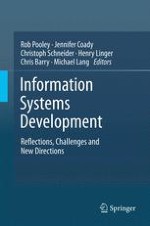2013 | OriginalPaper | Chapter
40. Incorporating Users into AmI System Design: From Requirements Toward Automation
Authors : Estefanía Serral, Luca Sabatucci, Chiara Leonardi, Pedro Valderas, Angelo Susi, Massimo Zancanaro, Vicente Pelechano
Published in: Information Systems Development
Publisher: Springer New York
Activate our intelligent search to find suitable subject content or patents.
Select sections of text to find matching patents with Artificial Intelligence. powered by
Select sections of text to find additional relevant content using AI-assisted search. powered by
